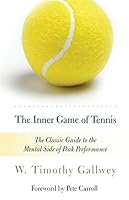
The Inner Game of Tennis

game. Today I play every point to win. It’s simple and it’s good. I don’t worry about winning or losing the match, but whether or not I am making the maximum effort during every point because I realize that that is where the true value lies.
W Timothy Gallwey • The Inner Game of Tennis
winner. The defensive player waits for their opponent to make an error and wears them down by degrees with endless patience. Some Italian clay-court players used to be the prototype for this style. The opposite of this is the offensive style. In its extreme form the ball is hit for a winner every time. Every serve is designed to be an ace, every
... See moreW Timothy Gallwey • The Inner Game of Tennis
Perhaps the most simple and effective means of focus I found was a very simple exercise I called “Bounce-Hit.” The instructions I gave students were very simple. “Say the word bounce out loud the instant you see the ball hit the court and the word hit the instant the ball makes contact with the racket—either racket.” Saying the words out loud gave
... See moreW Timothy Gallwey • The Inner Game of Tennis
state for returning it. You tend to react faster and move better, and by doing so, you make it more challenging for your opponent. You tend to build confidence in your opponent as well as in yourself and this greatly aids your sense of anticipation. Then at the end you shake hands with your opponent, and regardless of who won you thank them for the
... See moreW Timothy Gallwey • The Inner Game of Tennis
I had tried to be as honest as I could about the worst possible results. They weren’t good, but neither were they unbearable—certainly not bad enough to get upset about. Then I asked myself, “What’s the best that could happen?” Again the answer was clear: I could win 6–0, 6–0. “Then what?” “I’d have to play another match, and then another until I
... See moreW Timothy Gallwey • The Inner Game of Tennis
Once you are competing it is too late to work on your strokes, but it is possible to hold in your mind the image of where you want the ball to go and then allow the body to do what is necessary to hit it there.
W Timothy Gallwey • The Inner Game of Tennis
As one achieves focus, the mind quiets. As the mind is kept in the present, it becomes calm. Focus means keeping the mind now and here.
W Timothy Gallwey • The Inner Game of Tennis
But the trusting and loving parent lets the child perform his own actions, even to the extent of making mistakes, because he trusts the child to learn from them.
W Timothy Gallwey • The Inner Game of Tennis
Getting it together mentally in tennis involves the learning of several internal skills: 1) learning how to get the clearest possible picture of your desired outcomes; 2) learning how to trust Self 2 to perform at its best and learn from both successes and failures; and 3) learning to see “nonjudgmentally”—that is, to see what is happening rather
... See more